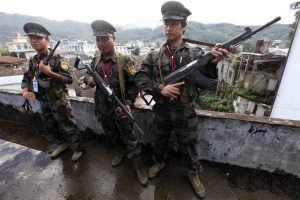As grisly milestones mount globally, our collective humanity is collapsing under the weight of unaccountable atrocities. More than three million people have been displaced since Myanmar’s 2021 coup, while millions more Syrians face acute hardship, as aid is cut and war continues. Five years after a popular uprising ousted the dictator, Omar al-Bashir, Sudan is on the precipice of collapse. The struggles of these three much-lauded people’s revolutions lay bare the barriers to historical justice and contemporary emancipation. While Israel’s unrelenting violence in Gaza compounds this bleak reality, recent actions by the International Criminal Court (ICC) and International Court of Justice (ICJ) have renewed considerations of accountability and justice. Although laudable against a baseline of impunity, we must prioritize supporting those on the frontlines against tyranny, amid the current crisis in global governance.
Challenging Oppression in the Search for Justice
The dynamics of popular resistance, violent suppression and justice are acutely intertwined in Myanmar. Military generals have routinely got away with brutalizing the population, their decades of post-independence tyrannical rule reaching a crescendo with the genocide against the Rohingya. International courts and sanctions have continually proven impotent in preventing or even reducing the military’s depravity. At the same time, colonially constructed borders are used as a veil for international neglect by the Association of Southeast Asian Nations (ASEAN) and others. The most recent coup, in February 2021, has provided yet another encore of systemic violence and repression, but the military regime faces unprecedented domestic opposition. As the revolution gains territory, the military has responded with indiscriminate military airstrikes that amount to war crimes. Despite these attacks, the resistance is unwavering.
Myanmar is not alone, as popular uprisings in Sudan, Syria, and elsewhere grind on against all odds and in the face of international apathy. ICC indictments failed to constrain al-Bashir, and it was widespread mobilization that ultimately dislodged him from power. International mechanisms have similarly proven futile for Bashar al-Assad’s atrocities in Syria, while global backing for the Syrian revolution has withered. Hope and possibility have been superseded by timidity and complacency. As Gaza is destroyed, red lines may cease to exist, but pursuits of justice do not.
Looking Forwards over Lamenting Backwards
The failures of international systems to – at a bare minimum – protect civilians, demands a rethink in how we conceptualize and pursue justice. Various global mechanisms and the surrogate human rights industry remain wedded to a technocratic logic. This is underpinned by an often-infantilizing belief that the rule of law can resurrect our fledgling collective humanity.
This creates a façade and seeming self-appeasement, where different states claim they are taking definitive action. As horrendous violence spread across Syria, Canada and the Netherlands belatedly filed an ICJ case against Assad for torture and France recently convicted three senior Syrian officials (in absentia). Yet, the same war crimes continue unabated, as Western legal constructs grasp for practical relevance. Global events continue to reinforce that justice is best sought proactively rather than tediously pursued, after the act.
This means shedding our preoccupation with retrospective justice, a dominant concept, despite its lack of efficacy, as the mass atrocities mount. It fails not just on deterrence and accountability, but in doing so, becomes antithetical to even the revered rule of law. The notion of the “rules-based order” rings hollow when war criminals walk free; curtailing their international travel hardly counts as a win.
Proactive Justice and Embracing Complexity
Whether it’s decades of occupation in Palestine or generations of military rule in Myanmar, proactive justice is not abstract, but crystallizes with and is defined by those opposing tyranny. In the former case, sovereignty and freedom are central, in the latter, federal democracy and inter-ethnic equity. Both demand peace, not systemic violence. Rather than the reductionism associated with international courts, where even the most glaring atrocities take years to prosecute, if at all, people challenging tyranny continue to articulate far more nuanced and locally relevant concepts of justice. This is centered on emancipation and addressing key drivers of inequity, namely political solutions rather than technical legalities. None of this is new, yet the urgency for reconfiguring our approach grows more acute by the day.
The current constellations of geopolitics pose one of the most significant barriers to justice, whether the United States and Germany’s morally untenable support for Israel’s atrocities in Gaza, Iran and Russia’s propping up of Assad, or the United Arab Emirates fueling of the war in Sudan. Rather than perpetuate complacency, such challenges reinforce the necessity of alternatives. A resurgence in Global South solidarity, from Colombia to Indonesia to South Africa, and defiant voices of reason in Ireland, Norway, and Spain, indicate that geopolitics is more than nefarious terrain. Such progress must, however, connect with locally-led movements, symbolic actions matched with tangible assistance.
Liberation Beyond Alleviation
Myanmar’s current situation is again salient. As the resistance has made remarkable battlefield progress since October, the international community remains stuck on providing piecemeal humanitarian funding. Lessons from Syria must be heeded, specifically that the revolution’s success is not assured, and that appropriate support now is the best inoculation for tyranny later. This means looking beyond international aid agencies to instead support emancipatory movements.
For just one example, preventing the Myanmar military’s ability to carry out airstrikes will save civilian lives, reduce humanitarian needs, and accelerate the liberation of territory. Such thinking is hardly profound, yet remains sequestered to Ukraine, while multiple countries are more willing to export weapons that kill in Gaza than support Myanmar’s revolution by defending civilians against airstrikes.
A commitment to proactive justice means aligning support with the people opposing tyranny – and not just during moments of success, but also when the challenges are mounting. It means looking beyond alleviating hardship to supporting liberation. It entails dynamic activism and requires prioritizing locally relevant justice rather than internationally defined. Perhaps above all else, from Myanmar to Gaza, Sudan to Syria, it demands an end to pervasive global inertia. Humanitarian needs must be met, but solidarity must prevail.

































